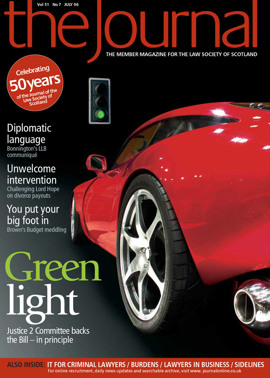The EU and the criminal

In the Journal, November 2005, 22, an article entitled “Combating the Cross Border Criminal” gave an insight into the mechanisms set up to enable much closer co-operation between Europe’s law enforcement agencies and judicial authorities. Reporting on a conference on these issues, we were told: “The EU is playing catch-up as organised criminals have made the most of the free movement resulting from the single market and the removal of the internal frontiers in Europe.”
National governments have realised that they cannot tackle this phenomenon alone. This has led to the development of a fledgling European criminal justice system, the debate on which now tops the EU’s legislative and political agenda. However, whilst in the current political climate the “fight against terrorism” may grab the headlines, work in this area has been ongoing for a number of years.
Since the 1993 Maastricht Treaty first introduced the notion of co-operation in the field of justice and home affairs we have come a long way. On an institutional level, the judicial co-operation body Eurojust sits alongside the police co-operation agency Europol. Legislatively, the EU has established common definitions in relation to trafficking, corruption, money laundering and terrorism, to name but a few. It has also set out standard procedures in relation to cross-border recovery of assets, freezing of evidence and confiscation – not to mention having created the European arrest warrant and being in the process of finalising the European evidence warrant!
The cornerstone: mutual recognition
The development of European criminal law is based on two core concepts: mutual recognition and mutual trust. The Tampere Conclusions called for the principle of mutual recognition of decisions of judicial authorities to be the “cornerstone” of judicial co-operation in civil and criminal matters. The European Court of Justice has highlighted the principle as a prerequisite for judicial co-operation. Mutual recognition has been the basis for the European arrest warrant and European evidence warrant and is essentially the means by which a foreign order can be treated as if it were a domestic order.
A number of other initiatives are being developed on the basis of mutual recognition – principally in relation to exchange of information on criminal records and the effect of previous convictions. The European Commission, responding to requests for action from national governments, has brought forward a number of proposals designed to help overcome the problems to date in terms of information exchange: identifying a member state in which an individual has already been convicted; obtaining information quickly and by a simple procedure; and understanding the information provided.
Rules designed to speed up current information exchange procedures were set out in a decision adopted on 21 November 2005. This was to be implemented into national legislation by May of this year. This is the first step and work is ongoing in terms of creating a European format for criminal records and a computerised index.
Work is also ongoing in the form of a draft framework decision on taking account of convictions in the course of new criminal proceedings. The aim is to require member states to treat convictions from other EU countries as they would domestic convictions and, on the basis of mutual recognition, take them into account accordingly.
The counterweight: mutual trust
Instruments based on mutual recognition have speeded up cross-border criminal proceedings and in doing so have removed a number of traditional protections, including the dual criminality verification process – essentially a check that the criminal activity forming the basis of a request for information or evidence is a crime in the requested state. To counter-balance this and to ensure that such fast-track mechanisms do not impinge on individuals’ rights, the EU has sought to develop the principle of mutual trust. For mutual recognition to function effectively it has to be based on a common trust of the effective administration of justice and the protection of fundamental rights in every member state.
The basis of this is found in the fact that each member state is a signatory to the European Convention on Human Rights, which is in turn enshrined in article 6 of the Treaty on European Union. However, the Commission considers that this mutual trust needs to be enhanced by specific legislative action at EU level, principally the adoption of the proposed framework decision on certain procedural rights in criminal proceedings. This sets out minimum standards in relation to the right to legal assistance, the right to interpretation and translation and the right to information. Common standards will not only protect the individual but lay a foundation of mutual trust that will allow mutual recognition to thrive.
As stated in the Hague Programme, the action plan set down by member states for work in this area for 2004-2009: “The further realisation of mutual recognition as the cornerstone of judicial cooperation implies the development of equivalent standards for procedural rights in criminal proceedings”.
Defence rights
In addition to procedural rights, the Commission is currently working on a number of other proposals both in relation to bail and evidence-based safeguards. The Commission has recently launched a consultation on the presumption of innocence. Starting from the basis that the presumption is a fundamental right, it sets out to determine whether each member state treats the presumption in the same way, what rights stem from this principle and whether there is a need to include these in a future proposal for a framework decision on evidence-based safeguards.
In relation to bail, the Commission recently discussed minimum standards in pre-trial detention and is set to launch a legislative proposal on mutual recognition of pre-trial detention conditions. Dubbed “euro-bail”, this seeks to enable a foreign defendant to undertake their bail conditions in their own country/country of habitual residence on condition that they return to trial.
The question of linking a defendant to his own country is also the subject of a piece of legislation which seeks to speed up the process of transferring a sentenced person to their “home” member state, where it is felt that “optimum social rehabilitation” can be achieved.
Practitioner involvement
As the debate goes on at European level between decision makers and legislators, the impact back home is often forgotten. Judges, prosecutors and officials from the Ministries of Justice regularly convene to debate these issues and negotiate on legislative procedures. The European Commission is keen to involve all legal practitioners in the debate and principally those from the defence perspective. The Commission holds a number of public consultations on key legislative initiatives and these can be accessed at http://ec.europa.eu/justice_home/news/consulting_public/news_consulting_public_en.htm.
Practitioners can also be involved through their national bars and law societies, and the Commission has received a number of submissions from the Law Society of Scotland on matters such as procedural safeguards, bail, conflicts of jurisdiction and the principle of ne bis in idem (double jeopardy). I can only encourage you to keep up the good work!
European criminal law enters the mainstream
Writing from Brussels, the so-called “heart of Europe”, it is sometimes difficult to imagine that EU criminal justice – highly controversial here – is not often a topic of debate amongst criminal lawyers. Anti-terrorism, the fight against serious organised crime, political battles over national sovereignty – gripping stuff to some but bearing little relation to practitioners’ day-to-day lives from Glasgow to Gdansk.
But why is this? Once the preserve of extradition lawyers, EU criminal justice is starting to enter the mainstream through issues such as bail, criminal records and the right to legal assistance. Legislative proposals will impact more and more on every criminal lawyer’s work – not to mention their clients’ fate.
That this is little known could be due to the obscurity by which decisions in Brussels are taken – the “third pillar” means little at the sheriff court on a wet Thursday. In addition, to become effective a proposal has to be transferred into national legislation. The framework decision on the execution of orders freezing evidence and property was implemented in the UK as the Crime (International Co-operation) Act 2003: not an obvious connection.
However, there is a pressing need for defence practitioners to be aware of European legislation coming down the line. Without a full understanding, sufficient challenge may not be made to sometimes quite draconian procedures. Evidence that ought not to be transferred may be en route under the European evidence warrant. A conviction quashed in one country may remain in the index of criminal convictions and be taken into account on sentencing in a later case. A foreign client could be remanded in custody when he should have had the opportunity to serve his bail term in his own country.
Whether there is real equality of arms in the development of EU criminal justice measures is questionable – there is certainly an emphasis on security over justice. However, whilst it is often hard for individual practitioners to take on the combined Ministries of Justice, there is ample opportunity for defence lawyers to make representations during the legislation process to ensure that the rights of the defence are not forgotten.
This can be done both at European level, through representation to the European Commission and Parliament, and at national level towards the Scottish Executive, Scottish Parliament and UK Government. The Criminal Law Committee of the Law Society of Scotland, in co-operation with the Society’s Brussels Office, regularly responds at all these levels.
By constantly reiterating the need for effective procedural safeguards that underpin the fast-track judicial co-operation mechanisms, the Society seeks to ensure that mutual trust does really exist and that the individual is protected all around Europe. Mutual trust and a belief in the value of mutual recognition can only develop on the basis that practitioners can rely on the concrete application of procedural rights and access to justice in the daily legal life of the member states. It is a campaign that must continue.
Julia Bateman is Justice and Home Affairs Policy Adviser at the Joint Brussels Office of the Law Societies of England and Wales, Scotland and Northern Ireland. To receive a copy of the free e-newsletter the “Brussels Agenda” or the EU Criminal Law Update, contact brussels@lawsociety.org.uk.
In this issue
- Challenging times
- A block on service
- Revving up for debate
- LLB confidential
- Clean break under attack
- The hokey-cokey Chancellor
- Switching channels
- The Chancellor gets it REIT
- Executries sponsored feature
- The EU and the criminal
- Case for the defence
- To act or not to act... that is the question!
- A summary matter
- Ireland 4, Italy 0
- The route ahead
- Scottish Solicitors Discipline Tribunal
- Website reviews
- Book reviews
- Is that burden dead yet?






